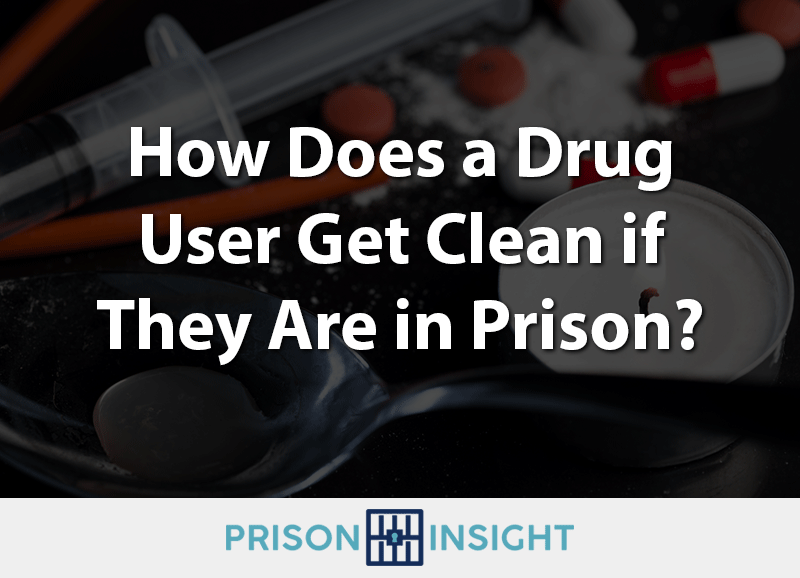Ever since the drug war began in the early 1970s, prisons have been filled with non-violent drug offenders who have problems with addiction. Many of these are people who are victim to themselves and their families.
The sad fact is that prison doesn’t usually help people with addiction issues. Unless the inmate has a strong desire to change their life and get clean, the problem tends to persist. Locking people in prison without addressing the true causes of their addiction issues is the path society has chosen, and it doesn’t seem to be changing anytime soon.
I do not have addiction issues, but I contacted a friend of mine who is currently serving a 20-year sentence. I asked her about today’s blog topic, so I could get an answer to this question: How does a drug user get clean if they are in prison?
This blog post will cover the following topics:
- Getting Clean is Like the Streets
- Drug Use is From a Bigger Problem
- Incarceration Can Result in Healing
- Prison Programming Can Help
Getting Clean is Like the Streets
Getting off drugs is a struggle no matter where you are. It requires making a decision and doing whatever it takes to follow through. Whether in prison or on the streets, it requires changing things about your life that enable you to use or cause you to experience the desire to use.
Drug abuse is a behavioral problem, one that stems from brokenness inside of the user. This means that when an addict stops using drugs, it is only treating the symptom of a deeper issue. In order to find true and lasting freedom from drugs or alcohol, one must explore the root issues that have led to the unhealthy behaviors.
Drug Use is From a Bigger Problem
According to my friend Mistie, a former drug addict who is currently serving time in prison, her first addiction was self-mutilation.
“My first addictions were self-mutilation in the form of cutting, and starving myself until I developed anorexia nervosa. These were coping mechanisms I used to cover the pain of living in a psychologically and sexually abusive home, abandonment issues from being adopted, and being bullied in school,” explained Mistie. “I was kept isolated most of my childhood and didn’t have anyone that I could turn to who would listen and understand, so I found my solace in unhealthy behaviors.”
Mistie says that when she got older she experienced the revolving door of foster care, and tried drinking and drugs for the first time. Her life became a series of abusive relationships, unhealthy behaviors and various addictions. At 32 years old, she found herself sitting on a twenty-year prison sentence for voluntary manslaughter and armed criminal action.
Incarceration Can Result in Healing
Mistie’s healing came during her incarceration. It started with her making the choice to live differently, and making decisions that reflected that choice. It required a complete overhaul spiritually, mentally, emotionally, and physically.
She says that learning balance was essential in her quest for freedom from addiction, as was learning to function in a community instead of feeling the need to isolate from everyone.
Prison can be a life changing experience for a drug user if they take advantage of the opportunities available. Prison is an environment where you choose who you associate with and who you choose to exclude from your life. In order to become healthy emotionally, you must keep positive people around you and avoid people who leave you feeling bad about yourself.
For many addicts, this is difficult outside of prison because it would mean excluding friends and family members who are unhealthy. Sometimes love has to happen from a distance, and that is okay.
Prison Programming Can Help
There are many opportunities for growth in prison due to the abundance of programs available. Institutions have chapels with a variety of services, books, bible studies, and other literature available for spiritual growth.
There are educational opportunities through GED classes and vo-tech classes, mental health services to address the root emotional issues that lead to addictive personalities, and gymnasiums and outdoor recreation yards to aid in physical health.
By utilizing these resources, addicts can find a healthy balance in their lives and gain the confidence necessary to remain addiction free on the outside.
No matter where an addict is physically, it’s where they are mentally, emotionally, and spiritually that matters. Prison has a way of forcing addicts to part with their drug of choice, but inmates can get their hands on drugs if they know where to look.
Addicts suffer a horrible physical withdrawal and go through detox when they first get locked up, but by the end of their incarceration they will physically be free of their dependence on their substance of choice.
However, if they don’t have the proper support and therapy, and if the inmate goes back to their old surroundings (including being around toxic friends and family members), their chances of success plummet.
Mistie had success, but she hasn’t had the chance yet to relapse on the outside. Unfortunately, many inmates who get clean once they are locked up go right back to using when they are released.
For more than four decades, America has focused on getting rid of the supply of drugs by arresting dealers and squashing supply chains. Another opinion involves focusing on the demand for drugs, and the reason for why people turn to substances and get addicted. There may be more success in that.
Do you have a success story about a drug user getting clean in prison? Let us know in the comments below.
Source: I did a personal interview with inmate Mistie Vance
